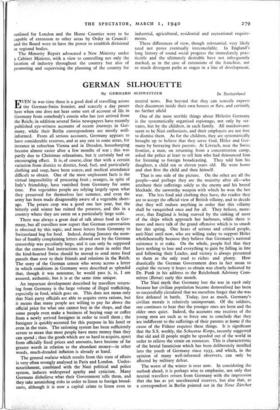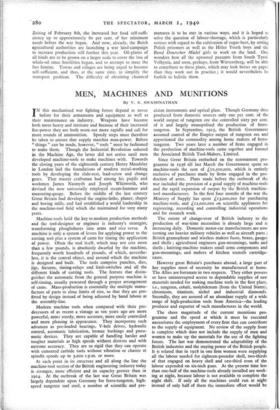GERMAN SILHOUETTE
By GERHARD SCHWEITZER
In Switzerland EVEN in war-time there is a good deal of travelling across the German-Swiss frontier, and scarcely a day passes here when one does not hear some sort of account of life in Germany from somebody's cousin who has just arrived from the Reich; in addition several Swiss newspapers have recently published eye-witness accounts of recent journeys in Ger- many, while their Berlin correspondents are mostly well- informed. From all serious accounts, Germany appears to have considerable reserves, and at any rate in some areas, for instance in suburban Vienna and in Dresden, housekeeping became almost easier after a few months of war ; this was partly due to Christmas relaxations, but it certainly had an encouraging effect. It is, of course, clear that with a certain variation from district to district, food, fuel, and particularly clothing and soap, have been scarce, and medical attendance difficult to obtain. One of the most unpleasant facts is the virtual impossibility of procuring fruit ; oranges, in spite of Italy's friendship, have vanished from Germany for some time. For vegetables people are relying largely upon what they preserved for themselves last summer, and even the army has been made disagreeably aware of a vegetable short- age. The potato crop was a good one last year, but the bitterly cold winter has ruined the potatoes, and this in a country where they are eaten on a particularly large scale.
There was always a great deal of talk about food in Ger- many, but all travellers now report that German conversation is obsessed by this topic, and most letters from Germany to Switzerland beg for food. Indeed, during January the num- ber of frankly complaining letters allowed out by the German censorship was peculiarly large, and it can only be supposed that the censors had instructions to pass them in order that the kind-hearted Swiss should be moved to send more food parcels than ever to their friends and relations in the Reich. The story of the German censor who wrote across a letter in which conditions in Germany were described as splendid that, though it was nonsense, he would pass it, is, I am assured, authentic, but it is at the same time unique.
An important development described by travellers return- ing from Germany is the large volume of illegal trafficking, especially in food, which goes on. This does not mean only that Nazi party officials are able to acquire extra rations, but it means that many people are willing to pay far above the official price for what one cannot buy in the shops, and that some people even make a business of buying soap or coffee from a newly arrived foreigner in order to resell them ; the foreigner is quickly accosted for this purpose in his hotel or even in the train. The rationing system has been sufficiently severe to mean that most people have more money than they can spend ; thus the goods which are so hard to acquire, apart from officially fixed prices and amounts, have become of far greater worth in relation to the abundant money—in other words, much-dreaded inflation is already at hand.
The general malaise which results from this state of affairs is very often wrongly analysed in Paris and London. Under- nourishment, combined with the Nazi political and police system, induces widespread apathy and cynicism. Many Germans disbelieve what their Government tells them, and they take astonishing risks in order to listen to foreign broad- casts, although it is now a capital crime to listen even to neutral news. But beyond that they can scarcely express their discontent inside their own houses or flats, and certainly no farther afield.
One of the most terrible things about Hitlerist Germany is the systematically organised espionage, not only by ser- vants, but by the children, in each family. All maidservants seem to be Nazi enthusiasts, and their employers are not free to dismiss them. As for the children, they are systematically brought up to believe that they serve God, Hitler and Ger- many by betraying their parents. At Liirrach, near the Swiss frontier, a man, on returning from a concentration camp, asked the police at least to tell him who had denounced him for listening to foreign broadcasting. They told him his daughter, a child ten or eleven years old. He went home and shot first the child and then himself.
That is one side of the picture. On the other are all the people—and perhaps they are the majority after all—who attribute their sufferings solely to the enemy and his brutal blockade, the unworthy weapon with which he won the last war. The less food and clothing they have, the readier they are to accept the official view of British villainy, and to decide that they will endure anything in order that this villainy shall be vanquished once and for all. They believe, more- over, that England is being starved by the sinking of most of the ships which approach her harbours, while there is more and more talk of the grand offensive which is to smash her this spring. One hears of serious and critical people, anti-Nazi until now, who are willing today to support Hitler wholeheartedly because they believe that Germany's national existence is at stake. On the whole, people feel that they have nothing to lose and everything to gain by falling in line and following their Leader, and victory is always presented to them as the only road to riches and plenty. How drastically the German Government does in fact mean to exploit the victory it hopes to obtain was clearly indicated by Dr. Funk in his address to the Reichsbank Advisory Com- mittee (Beirat) early this month.
The Nazi myth that Germany lost the war in 1918 only because her civilian population became demoralised has been so successfully circulated that we ourselves forget that she was first defeated in battle. Today, just as much, Germany's civilian morale is relatively unimportant. Of the soldiers, one continues to hear that the younger ones are keen and the older ones quiet. Indeed, the accounts one receives of the young men are such as to force one to conclude that they are indifferent to the sufferings of their parents at home if the cause of the Fiihrer requires these things. It is significant that the S.S. weekly, the Schwarze Korps, recently suggested that old and ill people might be speeded out of the world in order to relieve the strain on resources. This is characteristic of the brutal fanaticism which has been deliberately instilled into the youth of Germany since 1933, and which, in the opinion of many well-informed observers, can only be affected by military defeat.
The worst of the winter is over now. In considering the outlook ahead, it is perhaps wise to emphasise, not only that neutral travellers return from Germany with the impression that she has as yet unexhausted reserves, but also that, as -a correspondent in Berlin pointed out in the Neue Zurcher, Zeiting of February 8th, she increased her food self-suffi- ciency up to approximately 8o per cent, of her minimum needs before the war began. And now, already, the Reich agricultural authorities are launching a war land-campaign to increase production still further this year. Oil-plants of all kinds are to be grown on a larger scale to cover the loss of whale-oil since hostilities began, and to attempt to meet the fats famine. Towns and villages are being urged to become self-sufficient, and thus, at the same time, to simplify the transport problem. The difficulty of obtaining chemical manures is to be met in various ways, and it is hoped to solve the question of labour-shortage, which is particular)} serious with regard to the cultivation of sugar-beet, by setting Polish prisoners as well as the Hitler Youth boys and the Bund Deutscher Meuiel girls to work on the land. One wonders how all the uprooted peasants from South Tyrol. Volhynia, and soon, perhaps, from Wiirtemberg, will be able to contribute to these plans, which may look better on paper than they work out in practice ; it would nevertheless be foolish to belittle them.















































 Previous page
Previous page